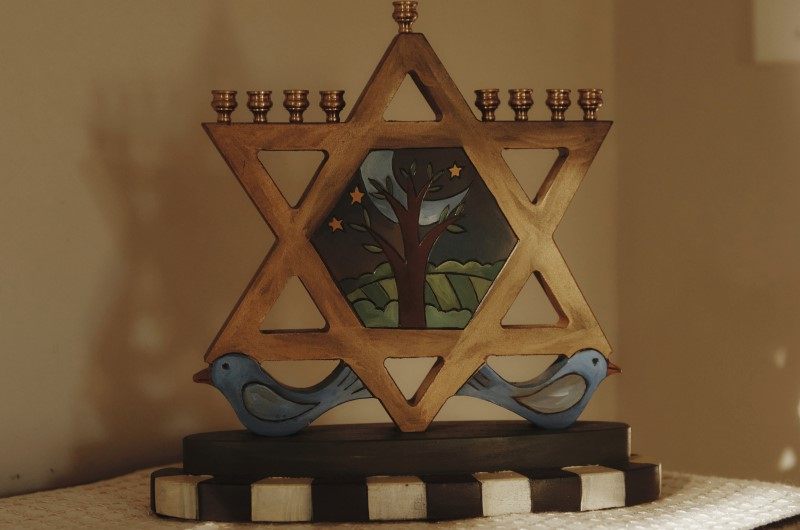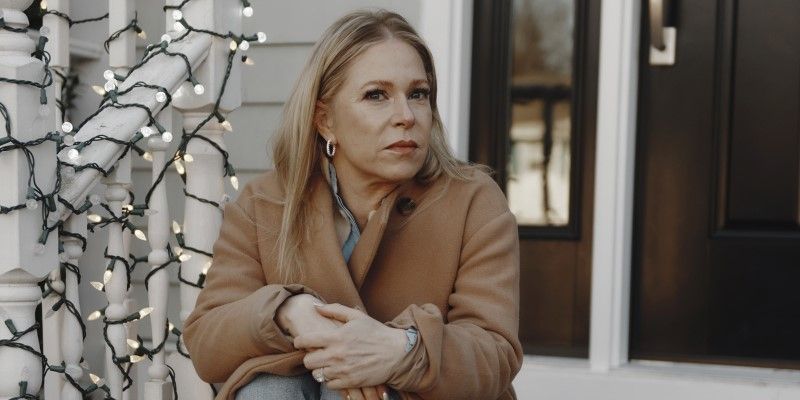
A menorah on display at the Lyons home.
11:15 JST, January 5, 2023
The 11-year-old girl in gray sweatpants and a hoodie walked down the porch steps then froze.
She stared at the ground for seven seconds, her family’s doorbell-camera footage shows. At her feet was a swastika. Someone had cut the Nazi symbol out of purple construction paper, adding a message in permanent marker: HELL BOUND. HAVE FUN!
She glanced around. This didn’t look like some random prank. Her family was one of the only Jewish households on their street in Stoneham, Mass. Five more swastikas littered the lawn that November morning. Five more menacing scribbles:
JEW BITCH.
JESUS HATER.
GO TO HELL, JEW BITCH.
The girl ran back inside.
The torrent of hate speech sweeping internet talk shows and social media is eroding the sense of safety for Jewish people across the United States. As celebrities like Ye, formerly known as Kanye West, and Kyrie Irving have promoted antisemitic conspiracy theories to their millions of fans – and former president Donald Trump dined at Mar-a-Lago with a Holocaust-denying podcaster – American Jews have faced harassment, vandalism and violence.
Since a gunman stormed Pittsburgh’s Tree of Life synagogue four years ago, killing 11 men and women in the deadliest rampage against Jews in U.S. history, researchers have recorded a steady acceleration in prejudice-fueled acts. Over the past two months, someone jumped an older Jewish man in New York, yelling antisemitic slurs and “Kanye 2024.” Someone else tagged tombstones with swastikas at a Jewish cemetery in suburban Chicago. Someone else spray-painted “Jews Not Welcome” near the entrance of a Maryland high school. Someone else passed out fliers in Los Angeles blaming Jews for the coronavirus pandemic.
Antisemitic attacks in the country have reached an all-time high, according to the latest audit from the Anti-Defamation League, which tallied 2,717 incidents in 2021. “It has gotten so normalized,” said Peggy Shukur, interim director of ADL New England, “and it’s happening in more personal ways.”
In Stoneham, the headlines had worried the girl’s mother, Stephanie Lyons, a 47-year-old family lawyer, but they didn’t surprise her.
When the economy sputters, when a virus spreads, people crave a scapegoat, and Jews have long been a target. Lyons had appreciated the billboards one nonprofit had posted around Boston. “We’re just 75 years since the gas chambers,” one read. “So no, a billboard calling out Jew hate isn’t an overreaction.”
Antisemitism had reached Lyons only in insidious ways – like when people tossed off comments about Jewish lawyers.

Stephanie Lyons at her home in Stoneham, Mass. Her youngest child found swastikas on their front lawn this fall.
Then her youngest child, Dylan, found swastikas on their front lawn.
Her fiance, Scott, is a police officer in another town, and his 25-year-old daughter Shauna normally drove Dylan to school. When Dylan told Shauna, she rushed to find Scott, who collected the swastikas in a plastic bag to save as evidence. He brought the bag to Lyons, who was getting ready for work.
“I just burst into tears,” she said. “Someone had taken the time to cut these swastikas out of paper and write those words. They knew where we lived. They knew we were Jewish.”
The question was: How? She didn’t talk much about her faith. She almost never attended synagogue. That was something Lyons wanted to change as her kids got older. Their father is Catholic, and she wanted them to embrace their Jewish side, too.
Scott called the Stoneham police, who announced an investigation. “There is no place for this kind of hate and bigotry in our community,” Police Chief James McIntyre said that day in a statement.
Lyons figured the culprit could face trespassing or vandalism charges. A divorce lawyer, she’d dealt with bursts of hostility for two decades, usually from bitter ex-husbands. None, however, had involved swastikas. Could one of her clients’ former partners have scattered the demented handicrafts?
Lyons told Dylan and her 15-year-old son, Max, to come straight home after school. She wanted to say it would be okay, but that didn’t feel quite right, so she tried to turn the pain into a lesson: This was what hate looked like. This is what they should never do.
Dylan calmed down with a hug, but Max told his guidance counselor he was worried about his mom. Instead of riding the bus back after football practice, he asked Lyons to come pick him up. He felt bad that his little sister had found the swastikas. If he hadn’t stayed behind for an orthodontist appointment that morning, it would have been him.
Lyons also posted on a neighborhood Facebook page: “Words cannot express waking up and finding this on my front stairs. Please let me know if anyone else found something similar.”
Within minutes, her phone began ringing: concerned neighbors, friends, colleagues. No one else had seen any swastikas.
“She sounded horrified,” said Al Farese, 50, an attorney who has known Lyons for years. “She said, ‘This is what my kids walked out to.’ You can’t undo that. Those kids lost a sense of innocence that day.”
Reporters started calling and news crews parked outside of her house, so Lyons drew the blinds and deleted her post, hoping the attention would fade. She didn’t want to attract any more danger. Max asked her if it was safe to walk out to her car to retrieve a forgotten water bottle.
Ten days earlier, Ye had tweeted he was “going death con 3 on JEWISH PEOPLE,” apparently referencing Defcon, the U.S. military defense readiness system. The comment was part of an antisemitic tirade that ultimately cost the rapper business deals worth millions before he appeared on Alex Jones’s far-right show and praised Hitler.
Ye, who has spoken openly about his mental health struggles, was not the only public figure spouting vitriol, but he was the loudest. White supremacist networks co-opted his words, and photographers captured one group of men raising their arms in Nazi salutes while draping a banner over a Los Angeles freeway that read, “Kanye is right about the Jews.” Red graffiti on one of the defaced Jewish graves outside Chicago read: “Kanye was rite.”
Across town from the Lyons home, Rabbi Jessica Lowenthal tracked the hate speech with dread.
After the Pittsburgh synagogue attack, her place of worship in Melrose, Mass., added security cameras. “We have people in charge of checking the doors, making sure they are locked,” she said, “and even with all that, you’re still thinking about it.”
The Tree of Life massacre had revealed how phony conspiracy theories inspire real violence. Before the ambush, the gunman had blamed Jews for bringing immigrant “invaders” to the United States. Any time a celebrity with a massive following derided Jews, Lowenthal braced for fallout.
Now one of her congregants was backing out of posing for a photo for a Jewish journal, saying she worried about becoming a target. And three miles from her temple, a family had woken up to swastikas in their yard.
Lowenthal contacted Lyons: Would you like to join us for Shabbat service?
Lyons had grown up a casual observer of Judaism. She felt more culturally Jewish than religiously devout. Still, she kept a menorah in her kitchen and built Hanukkah gingerbread houses with Dylan and Max. Reconnecting with the community sounded comforting, so she accepted the rabbi’s invitation.
When Lowenthal asked her to speak about her experience, Lyons told the room that, decades ago, her grandfather had tried to buy land in the predominantly Catholic area. The seller had refused to consider his bid because he was Jewish.
“You think that so much changes over times,” Lyons said, “but here we are. It pulls you back 70 years.”
Women wrapped her in hugs. She’d wanted to love the temple and had considered starting to go regularly, but Lyons couldn’t relax. The temple had a doorbell camera, which pinged when people approached.
“Every time that ring went off, all I could imagine was something bad happening,” she said. “It wasn’t their fault. At all. I felt like a crazy gunman was going to come through there at any time.”
She wouldn’t be bringing her kids there.
Weeks passed. Lyons bought more security cameras. Dylan, never one to dwell on the past, was focused on competitive cheerleading. Max’s classmates had rallied around him, and the principal sent out an email condemning antisemitism.
But one December afternoon, as Dylan practiced front handsprings in their yard, Lyons fought the urge to call her inside. The police hadn’t identified any suspects – at least not to her. All the department said publicly was that the investigation continued.
Cars streamed past the house.
“This anxiety just reached over me,” Lyons said. “Oh my God, that person is still out there. Are they driving by right now? Can they see my daughter?”
Top Articles in News Services
-

Survey Shows False Election Info Perceived as True
-

Prudential Life Expected to Face Inspection over Fraud
-

Hong Kong Ex-Publisher Jimmy Lai’s Sentence Raises International Outcry as China Defends It
-

Japan’s Nikkei Stock Average Touches 58,000 as Yen, Jgbs Rally on Election Fallout (UPDATE 1)
-

Japan’s Nikkei Stock Average Falls as US-Iran Tensions Unsettle Investors (UPDATE 1)
JN ACCESS RANKING
-

Japan PM Takaichi’s Cabinet Resigns en Masse
-

Japan Institute to Use Domestic Commercial Optical Lattice Clock to Set Japan Standard Time
-

Israeli Ambassador to Japan Speaks about Japan’s Role in the Reconstruction of Gaza
-

Man Infected with Measles Reportedly Dined at Restaurant in Tokyo Station
-

Videos Plagiarized, Reposted with False Subtitles Claiming ‘Ryukyu Belongs to China’; Anti-China False Information Also Posted in Japan
























